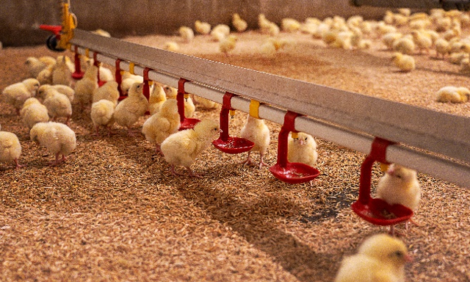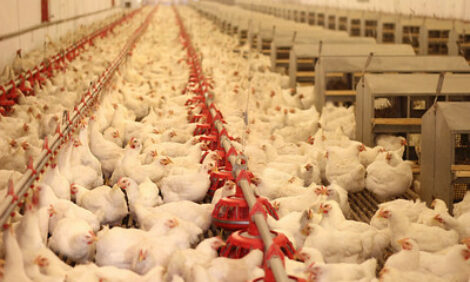



Proposition 2 - New Rules on Animal Welfare
Controversial animal welfare legislation was given the green light in California on 4 November at the same time that Barack Obama was voted into office as the President of the USA, writes ThePoultrySite Senior Editor, Chris Harris.Proposition 2 was one of a number of law changes that the California electorate had to decide on at the same time as they were choosing their new president.
The Proposition broadly lays down regulations for housing animals ensuring they have enough space to move.
It requires that calves raised for veal, egg-laying hens and pregnant pigs should be confined only in ways that allow these animals to lie down, stand up, fully extend their limbs and turn around freely.
Exceptions have been made for transportation, rodeos, fairs, 4-H programs, lawful slaughter, research and veterinary purposes.
However, any breaches of the regulations would incur misdemeanour penalties, including a fine of up to $1,000 and/or imprisonment for up to 180 days.
The legislation has been introduced because of rising concerns in California among the public over the way teat the state's 40 million farm animals were being treated.
The state legislature said that in recent years, there has been a growing public awareness about farm animal production methods, and how these practices affect the treatment of the animals.
"In particular, concerns have been expressed about some animal farming practices, including the housing of certain animals in confined spaces, such as cages or other restrictive enclosures," the legislature said.
"Partly in response to these concerns, various animal farming industries have made changes in their production practices. For example, certain industries have developed guidelines and best practices aimed, in part, at improving the care and handling of farm animals.
"State law prohibits cruelty to animals. Under state law, for example, any person, who keeps an animal confined in an enclosed area, is required to provide it with an adequate exercise area, and permit access to adequate shelter, food, and water.
"Other laws specifically related to farm animals generally focus on the humane transportation and slaughter of these animals. Depending upon the specific violation, an individual could be found guilty of a misdemeanour or felony punishable by a fine, imprisonment, or both."
The legislature said that compared to current practices used by California farmers, the new law would mean they would have to find more space for their animals or provide other ways of housing pregnant sows, laying hens and veal calves.
It added that the new law could raise production costs or reduce production and profitability and at the same time state and local taxes might also be reduced.
"The magnitude of this fiscal effect is unknown, but potentially in the range of several million dollars annually," the Californian state legislature said.
It added that the law might also see small costs to the state and the local communities, but these costs it felt would be offset by any fines that were imposed.
Despite the animal welfare lobbyists, the Proposition met with some stiff opposition from different quarters.
Some of the opponents felt it was unnecessary, risky and extreme and just pandering to Washington based interest groups.
Concerns were raised not only about how much it would cost, but also about the fact that for poultry it was feared it would be an entrance path for avian influenza and salmonella.
The opponents, Californians for Safe Food, said that the Californian farmers protected consumers from disease through the modern housing methods.
They said it is an extreme measure that practically forces the hens outdoors for most of the time.
The opposition quotes the United States Animal Health Association saying: "This outdoor access enhances the likelihood that such poultry will have direct contact with migratory and wild birds as well as other animals, substantially increasing the risk of Avian Influenza, Exotic Newcastle Disease, and other diseases."
The opponents were concerned about transmission of diseases from the animals to humans and they complained that for laying hens, the new law would mean eggs would be transported into California from Mexico, where food safety and welfare standards were not the same.
They warned that the law could cost thousands of jobs and cost the state and the industry more than $600 million and it would increase the price of eggs.
In short California for Safe Food said the new regulation:
- Increases the risk of bird flu
- Increases the risk of food-borne illness, like salmonella
- Increases grocery prices of California eggs
- Costs thousands of California jobs and puts farmers out of business
- Costs California $615 million in economic activity
- Harms the environment by contributing to global warming
However, the proponents of the Proposition said that it is a "moderate measure that stops cruel and inhumane treatment of animals - ending the practice of cramming farm animals into cages so small that the animals can't even turn around or stretch their limbs".
They said it promotes food safety and supports family farmers as well as protecting the environment.
The backers of the law said: "It's simply wrong to confine veal calves, breeding pigs and egg-laying hens in tiny cages barely larger than their bodies."
They added: "Factory farmers have put our health at risk by allowing these terrible abuses, and now are recklessly telling us it's okay to keep animals in overcrowded, inhumane conditions. Cramming tens of thousands of animals into tiny cages fosters the spread of animal diseases that may affect people."
The argument for the regulation continued: "California family farmers support Proposition 2 because they believe food quality and safety are enhanced by better farming practices.
"Factory farms cut corners and drive family farmers out of business when they put profits ahead of animal welfare and our health."
The proponents said that there is adequate time for farmers to make the changes as the law does not come into effect until 2015 and as states such as Arizona, Colorado, Florida and Oregon have already passed similar laws, it was time California joined them.
Further Reading
| - | You can view the details of Proposition 2 by clicking here. |
November 2008








